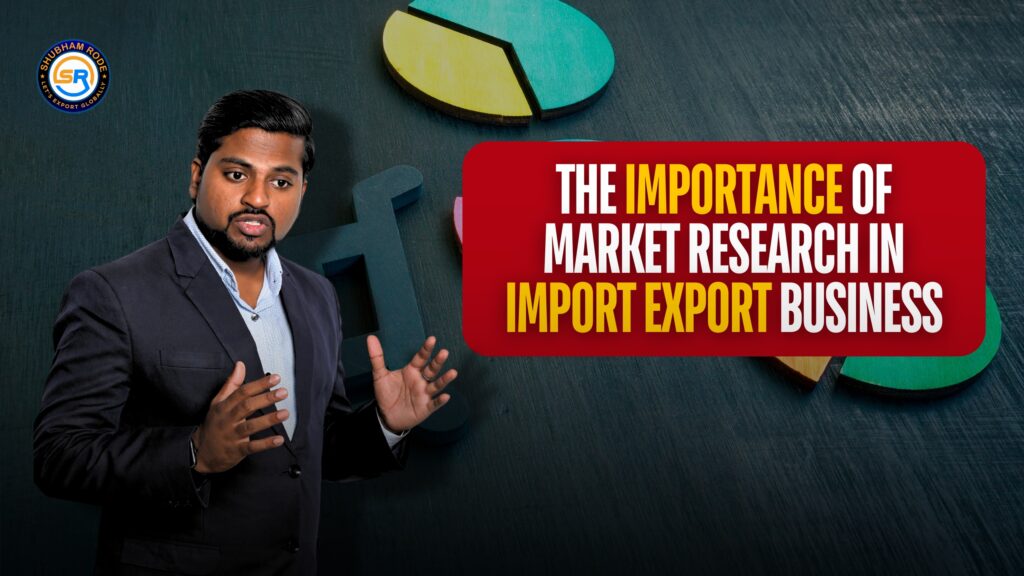In the intricate world of the Import Export Business, success hinges on more than just the ability to move products across borders. At the core of every successful international trade endeavor lies a deep understanding of markets—both domestic and foreign.
It’s this understanding, rooted in comprehensive market research, that allows businesses to tailor their strategies, predict challenges, and capitalize on opportunities. In this exposition, we explore the multifaceted role of market research in shaping the trajectory of businesses in the global trade arena.
As businesses delve into the vibrant tapestry of global commerce, they find themselves navigating the ebbs and flows of an ever-changing landscape. The global trade environment, akin to a mighty river, is perpetually reshaping its course, driven by a myriad of external factors. Two predominant forces shaping this terrain are geopolitical shifts and rapid technological advancements.
Geopolitical Shifts: Politics and trade have been intertwined since time immemorial. Trade policies, diplomatic relations, regional alliances, and even global events such as wars or political upheavals, have profound impacts on Import Export Business. For instance, a new trade agreement between countries can open up vast new markets overnight, while diplomatic tensions can equally quickly impose embargoes or tariffs.
Emerging Markets: As economies develop, new markets continually emerge. Countries that were once considered challenging for business might become hotspots of consumer activity. For instance, the rise of middle-class consumers in regions like Africa and Southeast Asia presents vast potential.
Technological Leverage: With the advent of digital platforms, businesses can now tap into markets they couldn’t have accessed before. This digital reach extends to marketing, sales, and even post-sales customer support.
As businesses venture into the intricate web of global trade, they find that each market, with its unique idiosyncrasies, demands a tailored approach. Success in the Import Export Business isn’t just about having an exceptional product or service; it’s about aligning that offering with the market’s dynamics.
Importers fulfill domestic demand by sourcing goods from international markets, while exporters share their offerings with the world. This international trade acts like a giant trading business, connecting nations and enhancing diversity by making various products available to everyone.
The linchpin to achieving this alignment is comprehensive market research. Let’s delve into the foundational pillars of market research in the international trade arena:Importers fulfill domestic demand by sourcing goods from international markets, while exporters share their offerings with the world. This international trade acts like a giant trading business, connecting nations and enhancing diversity by making various products available to everyone.
Business A: Tapping into Southeast Asian Dietary Habits
Southeast Asia, with its rich tapestry of cultures and traditions, offers a myriad of opportunities for businesses. Business A, a burgeoning health food company, sought to introduce a new food supplement to this market. Their initial product formulation was based on Western dietary preferences. However, before the launch, they wisely invested in local market research.
Insightful Discoveries: The research unveiled a pivotal fact: Southeast Asian diets were predominantly carbohydrate-rich, with a heavy reliance on rice and noodles. Additionally, there was a growing trend towards natural, herbal supplements, deeply rooted in traditional medicine practices
Strategic Pivot: Armed with these insights, Business A reformulated their product, infusing it with locally sourced herbs known for health benefits. They also positioned it as a supplement complementing carbohydrate-rich meals, ensuring better nutrient balance.
Outcome: The product, resonating deeply with local dietary habits and preferences, witnessed a stellar reception, establishing Business A as a trusted health food brand in the region.
Business B: The European Tech Misadventure
Business B, a tech giant, was all set to launch an innovative gadget in the European market. Relying on their brand reputation and the product’s success in their home market, they skipped in-depth local market research.
The Launch: Initial sales skyrocketed, primarily driven by the brand’s global reputation and the product’s novelty. However, soon after, sales plummeted, and negative feedback started pouring in.
The Oversight: Business B’s product, while technologically advanced, overlooked a key cultural preference prevalent in many European nations—privacy. The gadget’s default settings, which shared user data for an enhanced experience, were perceived as invasive.
The Aftermath: The negative publicity, combined with strong local competitors who capitalized on this oversight, resulted in substantial financial losses and brand reputation damage for Business B.
Retrospection: Had Business B invested in comprehensive market research, they would have identified the strong European sentiment towards data privacy and adjusted their product features accordingly.
